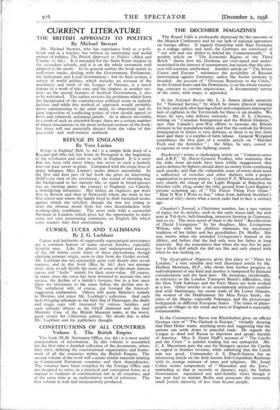THE DECEMBER MAGAZINES
The Round Tage is profoundly depressed by the outcome of the Munich Conference and by our lack of national agreement on foreign affairs. It regards friendship with Nazi Germany as a mirage unless and until the Germans' are convinced of " our will and our ability to defend the Commonwealth." A notable article on " The Economic &tithe of the Third Reich " shows how the Germans are over-taxed and under- nourished in the interest of rearmament, but insists that this pro- cess will continue unchecked. Another article on " The Soviet Union and Europe " minimises the possibility of Russian intervention_ against Germany, unless the Soviet territory is invaded. An account of " Oirerseas Reactions to the Crisis," in the United States and the Dominions, is on the whole reassur- ing, contrary to current impressions. A documentary survey of the crisis, with maps, is appended.
In the National Review Mr. L. S. Amery pleads earnestly for " National Service," by which he means physical training for boys and girls after leaving school and compulsory training for lads of eighteen in the Territorials for three or six months. We must, he says, take defence seriously. Mr. E. L. Chicanot, writing on " Canadian Immigration and the British Element," says -that Canada's post-War efforts to increase the British element in her population failed, and that the outlook for British immigration in future is very dubious, as there is no free farm land and there is a surplus -of farm labour... General Weygand contributes the first part of a notable article on " Marshal Foch and the Armistice " ; the Allies, he says, ceased to co-operate as soonas the fighting ceased.
Blackwood's prints a challenging article on " Common-sense and A.R.P." by Major-General Foulkes, who maintains that the risks from air-raids have been wildly exaggerated, that active defence by fighters should deter an enemy from continuing such attacks, and that the vulnerable areas of towns alone need a sufficiency of trenches and other shelters, with a proper organisation to prevent panics. Colonel F. E. Whitton describes very clearly the charge of the Light Brigade at Balaclava on October 25th, 1854, under the title, quoted from Lord Raglan's private summing up, of " The Finest Thing Ever Done." " How It Was I Went to Sea," taken from Admiral Stoddart's journal of 1827, shows what a naval cadet had to face a century ago.
. .
ChamberS's journal, a Christmas number, has a rare variety of topics for its articles, such as the early music-hall, the new port at Tel-Aviv, bell-founding, intensive farming in Guernsey, and so. on. The most novel of them is the brief " Recollections of David Livingstone " by his daughter, Mrs. Livingstone Wilson, who with her children maintains the missionary 'tradition of her father and her grandfather, Dr. Moffat. She was - twelve when she attended Livingstone's funeral in the Abbey, and before that she had only seen her father at long intervals. But she remembers that when she was five he gave her a black doll which she did not like and only played with when he was looking on • The Geographical Magazine gives first place to " Plans for London," a very sensible and well illustrated article by Mr. Herbert Morrison,. M.P., who shows how further progress in redevelopment of one kirid-and another is hampered by financial considerations and the land laws. He mentions, incidentally, in reference to the London' Transport Board's difficulties, that the New York Subways and the Paris Metro are both worked at -a loss. Other articles in an uncommonly attractive number deal with Martinique, the caviar trade of the Lower Danube, the women of the Hadhramaut (by Miss Freya Stark), the cities- of theMayas, especially -Palenque, and the picturesque bodyguards in different European States. The series of photo- graphs of villages in the south and west of England is especially commendable.
In the Contemporary. Baron von Rheinbuben gives an official German view of " The Outlook in Europe," virtually denying that Herr Hitler wants anything more and suggesting that the nations can settle down to peaceful trade. He regardi the League as dead and Russia as impotent and speaks harshly of America. Miss S. Grant Duff's account of " The Czechs and the Crisis " is painful reading but not unhopeful. Mr. C. A. Macartney puts the case for Hungary against the Czechs in regard to frontier revision, while admitting that' the Czech rule was - good. Commander A. S. Elwell-Sutton has an interesting article on the little known Sub-Carpathian Ruthenia with its strange mixture of races and religions. Mr. Israel Cohen writes temperately- of " Mussolini and the -Jews," reminding us that as recently as January, 1937, the Italian Government repudiated any anti-Semitic views though it has now had to imitate Berlin and persecute the extremely small Jewish minority of less than 6o,00apeople.


























































 Previous page
Previous page